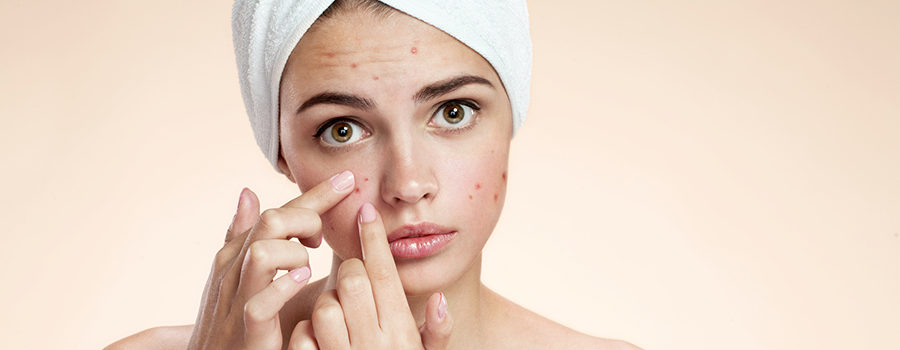 Acne vulgaris is the most common dermatological issue seen by physicians. It is a condition that can cause a lot of distress, resulting in lowered self-esteem in some. Often patients will seek pharmaceutical treatments such as the oral contraceptive pill, spironolactone or Accutane in order to seek some relief for their skin, which can come with nutrient depletions, risks and side effects. Naturopathic medicine aims to target the cause of acne from the inside out and offers safe and effective treatments for long-term resolution of this skin condition. Diet – The Case against Dairy and Sugar
An important study came out in 2012, which concluded that acne was absent in two populations; one who consumed a Paleolithic diet with a low glycemic load, and the other, a dairy-free diet. A cellular mechanism was elucidated which revealed that high glycemic foods and dairy increase levels of IGF-1 and insulin, which result in inflammation and specifically, an acne-promoting effect. Thus a diet deficient of dairy and high glycemic foods is an effective dietary strategy for reducing acne. Healing the Gut There is a strong connection between the skin and the health of our gastrointestinal system. Irritable bowel syndrome (IBS) is one of the most common gastrointestinal conditions, and includes symptoms of: irregular bowel movements, abdominal pain, bloating, etc. IBS is a condition of increased intestinal permeability and studies have shown increased intestinal permeability in patients with acne vulgaris, which demonstrates the need for treating IBS and testing for other gastrointestinal conditions. Vitamin A, Vitamin E and Zinc Vitamin A is essential for normal differentiation of epithelial tissues in the skin and mucous membranes and has been studied as an effective therapy for acne vulgaris. Consultation with a healthcare practitioner should occur before starting vitamin A therapy, as there are various contraindications such as pregnancy, liver disease and other conditions. A 2014 study evaluated the serum levels of vitamins E and zinc according to the severity of acne vulgaris. They found a negative correlation between acne severity and vitamin E and zinc levels, supporting the use of these important nutrients in acne prevention and treatment. A 2001 study found a total pimple count decrease of 49.8% when acne patients took 30 mg of zinc gluconate for 3 months. Omega 3 Fatty Acid and Gamma-Linolenic Acid (GLA) Omega 3 fatty acids are known for their anti-inflammatory action, and have been studied specifically to exhibit anti-inflammatory effects on the skin. A study found after 10 weeks of both omega 3 fatty acid and GLA supplementation, inflammatory and non-inflammatory acne lesions decreased significantly. Addressing Hormonal Imbalance Various acne treatments target different steps in the pathogenesis of acne, from decreasing inflammation to addressing hormonal imbalance, more specifically, counteracting high testosterone. Clinical trials have shown that oral contraceptives can be helpful in reducing acne by decreasing levels of free testosterone. There are a number of excellent herbs, which have this testosterone reducing effect, and offer effective treatment of acne. Conclusion There are many effective treatment options for acne vulgaris as evidenced by the research discussed in this article. A successful naturopathic approach to treating acne vulgaris will involve addressing the cause of the individual’s acne (e.g. inflammation, poor gut health, hormone imbalance) using a multi-faceted, holistic approach including dietary strategies, supplementation and topical support.
1 Comment
|
AuthorDr. Lara is a Naturopathic Doctor who is passionate about helping and empowering her patients in their journey towards lifelong health and wellness Categories
All
Archives
September 2021
|

